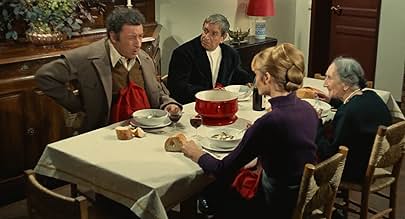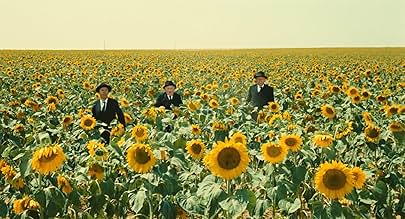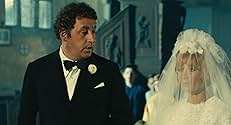IMDb RATING
7.3/10
2.5K
YOUR RATING
Alexandre, a young and honest farmer under the yoke of an authoritarian wife, works around the clock in the fields. When she dies in a car accident, it's a holiday for Alexandre.Alexandre, a young and honest farmer under the yoke of an authoritarian wife, works around the clock in the fields. When she dies in a car accident, it's a holiday for Alexandre.Alexandre, a young and honest farmer under the yoke of an authoritarian wife, works around the clock in the fields. When she dies in a car accident, it's a holiday for Alexandre.
- Director
- Writers
- Stars
- Director
- Writers
- All cast & crew
- Production, box office & more at IMDbPro
7.32.4K
1
2
3
4
5
6
7
8
9
10
Featured reviews
haunting film
This is a strangely great film. It is a comedy with many moments of uncontrollable hilarity. But what is special about it is that it haunts you long after you have seen it. The images sit vividly in your mind. The themes are built with great cleverness yet extremely subtly and entertainingly. This is a film of intelligence. It is superficially about the eternal war between men and women. But that is just the familiar context and not the real subject. It is really about small town customs and mores and how being different is a problem. It also has an extremely clever cyclical theme. This film ran continuously in Boston for years. (You can look it up.) It is not to be missed if at all possible. Anyone know how I can get a copy?
A long lost favorite that deserves a resurrection!
In an era that also gave us Peter Seller's Clouseau, Phillipe Noiret created another indelible comic character in Alexandre that deserves a certain degree of immortality. One can only hope that there is a vault somewhere that contains a decent print of the film and that the owners will see fit to preserve it. To describe "Alexandre le bienheureux" as charming is too soft a description -- it is social and political commentary wrapped in a delightful and hilarious package that has few equals. The ending was a revelation for a generation of young filmgoers who also believed there might be something more to life than laboring to gain subsistence. When it played in my hometown in the early 1970's -- in a limited run at the local art museum -- I dragged everyone I could find to it. Ah, to be able to do the same today!
I would love to see this one again!
I have been searching for this film -- in any format -- for years. I saw it twice in two days in the late sixties at a small museum theater that showed mostly foreign and art films. And although it is, admittedly, a slight film and probably no one's idea of a great cinematic masterpiece, it has more charm than 99 out of 100 Hollywood comedies. It may be that the anarchic feeling of the film dovetailed so well with our own rebelliousness of that era. Maybe it was the dog. I imagine running it on a double bill with Marcel Pagnol's "The Baker's Wife" -- now THAT would be something!
I have scoured the websites and catalogs of lots of distributors looking for some evidence that "Alexandre" is out there somewhere, aspiring to a new life on DVD (or even VHS!), but to no avail. Let's hope this charming gem of a comedy is not lost forever -- THAT would be a tragedy!
I have scoured the websites and catalogs of lots of distributors looking for some evidence that "Alexandre" is out there somewhere, aspiring to a new life on DVD (or even VHS!), but to no avail. Let's hope this charming gem of a comedy is not lost forever -- THAT would be a tragedy!
Like a good wine
This film follows the best tradition of the french comedy, managing outrageous, hilarious, unbelievable situations, yet without succumbing to cheap humour or to any kind of vulgarity.
Always pleasant to view, even after 32 years!
Always pleasant to view, even after 32 years!
Two roads diverged in a wood, and boy am I glad I chose the one I did!
A fable, a parable, an examination of the human condition, and a must see for anyone thinking of getting married. Certainly one of the strongest declarations on record of just why we love our dogs. There is always something rumpled about Noiret, a bit of a sad sack who somehow manages to wrest dignity from abuse or meager circumstance. Alexandre isn't his best film, or probably anybody's best film, but who can ignore this simple man who takes to bed, not in anguish over his loss, but in quiet enjoyment of what he has found through loss to the distress of his neighbors? Alexandre is a delicious comment on the benefits of breaking with convention and taking one's own road.
It's now many years after I wrote the review above. I didn't remember having written it, but now that I read it, I know I did. My opinion hasn't changed. I'd gladly give $100 to have a good copy, but it seems to be unavailable. If you're reading this, I've got two more to add, if you can find them: Giuseppe Tornatore's "A Pure Formality" starring Gerard Depardieu and Roman Polanski, simply one of the most mesmerizing movies I've ever seen; and "Le Cadeau" ("The Gift"), of which I can find no trace, about a bank clerk or accountant with a shrewish wife who takes off for Venice with a gift some co-workers gave him--a singularly beautiful prostitute. He comes back a changed man with a restored relationship with his wife. A great movie. Why are these so hard to track down?
It's now many years after I wrote the review above. I didn't remember having written it, but now that I read it, I know I did. My opinion hasn't changed. I'd gladly give $100 to have a good copy, but it seems to be unavailable. If you're reading this, I've got two more to add, if you can find them: Giuseppe Tornatore's "A Pure Formality" starring Gerard Depardieu and Roman Polanski, simply one of the most mesmerizing movies I've ever seen; and "Le Cadeau" ("The Gift"), of which I can find no trace, about a bank clerk or accountant with a shrewish wife who takes off for Venice with a gift some co-workers gave him--a singularly beautiful prostitute. He comes back a changed man with a restored relationship with his wife. A great movie. Why are these so hard to track down?
Did you know
- TriviaThe original painting of the film's poster by Raymond Savignac, which belonged to lead actor Philippe Noiret, was sold at auction in 2025 for 7500 euros.
- ConnectionsFeatured in Le bal des casse-pieds (1992)
- SoundtracksLe Ciel, la Terre et l'Eau
Music by Vladimir Cosma
Lyrics by Francis Lemarque
Performed by Isabelle Aubret
- How long is Very Happy Alexander?Powered by Alexa
Details
- Release date
- Country of origin
- Official site
- Language
- Also known as
- Alexander
- Filming locations
- Production companies
- See more company credits at IMDbPro
- Runtime
- 1h 40m(100 min)
- Sound mix
- Aspect ratio
- 1.85 : 1
Contribute to this page
Suggest an edit or add missing content


































